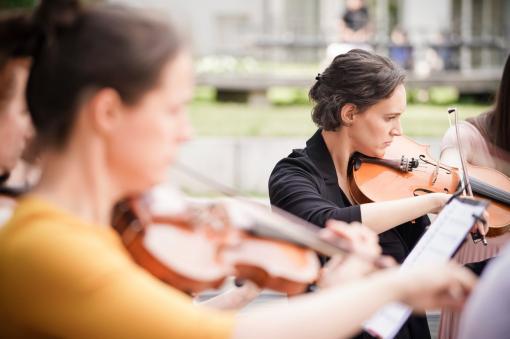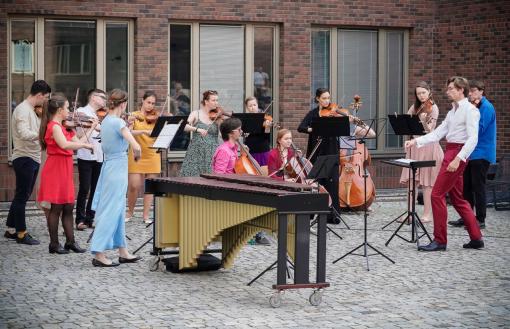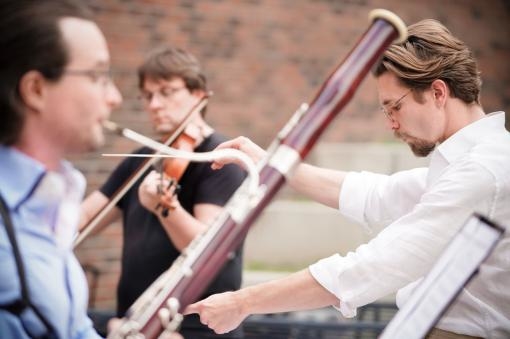On 22 June, the Ensemble Opera Diversa visited the atrium of the Faculty of Arts at Masaryk University on Arne Novák Street with the program Dances in the Gardens, which continued the series of outdoor projects started last year. Bassoonist Pavel Horák and marimba player Martin Švec performed as soloists. The concert was conducted by conductor Patrik Červák, who stood in front of the Ensemble Opera Diversa string orchestra for the very first time.
The evening of Dances in the Gardens was not only due to the pleasantly informal atmosphere of the university atrium, but above all to the selection of the compositions themselves. The program offered the world premieres of two dance suites: while the four-part Czech Suite was composed by Ondřej Šárek, the Scottish Serenade comes from the pen of Filip Holacký, who lives in Edinburgh. These dance-inspired pieces were complemented by the premiere of a small piece Seconda prattica IV for strings by Miloš Štědron, who celebrates his 80th birthday this year. The Czech premiere featured Marjan Mozetich’s Concerto for bassoon and strings with marimba.
Šárek’s Czech Suite for Strings opened Wednesday’s program. Those who might have expected harsh harmonies full of sharp dissonances and discord characteristic of much contemporary music would certainly have been surprised. This suite is listener-friendly, melodic to the point of neoclassical. The four-movement work (Kozlík, Talián, Sýkorka, Vejr) emphasizes typical Czech dances and the composer drew his main inspiration from the so-called máteniks, i.e. dances alternating between 2/4 and 3/4 time. The piece cannot be denied melodic likability and freshness, but the incessant movement in practically all voices combined with the not very contrasting dynamics starts to look static and aimless after a while. At first I thought that the lack of dynamic contrasts was due to the open space, which is not an acoustically ideal space. However, the next tracks refuted this impression. The piece definitely has potential – and the performance by the ensemble itself, as well as the staging by Patrik Červák, can be described as hilarious without any reservation. However, a thinning of the texture in certain places or at least more dynamic contrasts across the sections would have helped the work considerably.

The first half of the evening was closed by Marjan Mozetich’s Concerto for bassoon and strings with marimba, which was given its Czech premiere in the atrium of the Faculty of Arts of the Masaryk University. The one-movement work is characterized not only by its ubiquitous lyricism, but also by constantly recurring fast figurations and runs, which form a sonically and colorfully sympathetic contrast to the otherwise rather more static homophony. It is the transmission of the faster motif across the orchestra that creates ever new and fresh color contexts. Impressive was the placement of these runs in the violas, for example, while the rest of the ensemble kept the harmony walking leisurely. Conductor Patrik Červák exquisitely captured the fragility of the work, adapting not only the work with dynamics but also the tempo changes. The violinist Barbara Tolarová also deserves enormous praise, whose tender solo in extremely quiet dynamics was firm, clear, without the slightest tremor of the bow, yet exquisitely punctuated and emotionally charged. A separate chapter was the bassoon part in the staging by Pavel Horák, which, although not very virtuosic in the more melancholic parts, makes enormous demands on the performer in terms of tonal range and understanding of the piece and phrasing. In several places Mozetich gives the bassoon dizzying – and rather long – runs that already fall fully within the imagined virtuoso repertoire. Horák handles not only the tonal range and melodic leaps but also the dizzying runs to perfection. His work with dynamics and tone color was also flawless. The marimba part was taken by Martin Švec, who successfully completed the unusual color of the music by frequent doubling of bassoon or strings.
Miloš Štědron’s Miniatura Seconda prattica IV for strings follows his previous works of the same name for synthesizer from 1991, 1999, and 2001. This piece also has its origins – or at least inspiration – in music described as dance music. Here Štědroň has combined dodecaphonic passacaglia and folia, drawing in part on the language of the Monteverdi baroque and the influences of New Music. Seconda prattica IV is in a way a playful synthesis, in which the relatively calm levels of more traditional-sounding music are countered by sudden runs and figurations that would normally belong more in a different context. The musicians remained rhythmically unified under Červák’s direction. Dynamic contrasts then made it easier for the audience to find that "battle" of the old with the new.

The final piece, Filip Holacký’s Scottish Serenade for bassoon and strings, completed the imaginary circle and returned to the form of a multi-movement suite (Prelude, Waltz, Air: The Bonnie Banks o’Loch Lomond, Allegretto, Finale) with which the concert began. The movements themselves were based on the rhythms and melodies of Scottish folk songs. Indeed, Holacký based his Air on the melody of a folk song describing the beauty of the shores of Scotland’s largest loch. The piece is excellently crafted and does not lack exemplary work with rhythm, phrasing, and dynamics. The bassoon cadenza, with its fast chordal decays and sudden leaps, was mastered by Pavel Horák to perfection, maintaining lightness of tone and clarity of phrasing throughout. Patrik Červák also paid close attention to the rhythmic aspect of the individual movements, which, thanks to the unified orchestra, retained their typical Scottish vigor and danceability.
Dances in the Gardens in a pleasant environment – enhanced by the cool popsicles that everyone received – showed the friendly face of contemporary music. Not only were all of the works listener-friendly (while maintaining the high quality of the compositions), but in addition, with its casualness and informality, Ensemble Opera Diversa’s last concert so far helped to remove the elitist overlay that has settled on so-called classical music over the years. And it seems that dancing in the garden is the best way to fight the elitism of artistic music.
Ondřej Šárek: Czech Suite for Strings (2019) PREMIERE
Marjan Mozetich: Concerto for bassoon and strings with marimba (2003/2006) CZECH PREMIERE
Miloš Štědroň: Seconda prattica IV for strings (2022) PREMIERE
Filip Holacký: Scottish Serenade for bassoon and strings (2022) PREMIERE
bassoon Pavel Horák
marimba Martin Švec
Ensemble Opera Diversa, orchestra leader Jan Bělohlávek
conductor Patrik Červák
Atrium of the MU Faculty of Arts, 19:00
22 June 2022
































No comment added yet..